A key player in the financial technology realm, Block, Inc. (previously Square, Inc.), has made a name for itself with the popular application known as Cash App. This app is just a segment of Block’s vast array of offerings, including software solutions, point-of-sale hardware, and cryptocurrency services.
The company has diversified its business model into enterprise domains like scheduling, employee management, and business analysis, evolving from its initial focus on payment processing since its IPO in November 2015. The company is now one of the most significant payment processors in the United States.
Cash App was introduced by Block (then Square) in 2013 as a competitor to Apple Pay and other services. P2P (peer-to-peer) payment solutions such as these enable consumers to handle transactions effortlessly through their smartphones, allowing them to pay for services and goods, manage bills, and transfer funds to loved ones.
The platform has extended its capabilities beyond merely a P2P payment tool. Users can now receive payments directly and invest in stocks and ETFs without incurring commission fees. Additionally, there is the option to deal with cryptocurrency purchases.
By 2018, Cash App overtook Venmo in the number of times it was downloaded, boasting 33.5 million cumulative downloads. As of September 2023, there were 55 million monthly active users transacting on Cash App, while Venmo had approximately 90 million active accounts.
While downloading Cash App incurs no cost, its core features such as making P2P payments and transferring funds to a bank account remain free of charge.
Apart from transaction fees levied on individuals and businesses, the platform’s income also stems from subscription services and Bitcoin sales to users.
Various charges apply to businesses and customers; for instance, there are fees ranging from 0.5% to 1.75% for instant money withdrawals, diverging from the ordinary free two- to three-day transfers. Transactions utilizing a credit card are subject to a 3% fee.
Included in subscription services are the platform’s financial products like the Cash App Card and the associated expenses and fees for Cash App Instant Deposits.
Cash App’s largest revenue stream arises from its Bitcoin segment. Besides charging a service fee for Bitcoin transactions, the platform capitalizes on the variance, typically between 1% to 4%, in the prices offered by Bitcoin exchanges and buys. This difference enables Cash App to generate extra revenue.
Subscription Services
Cash App’s array of financial products, encompassing the Cash Card and Instant Deposit services, fall under the Subscription Services category. For Q3 2023, this segment reported an impressive $1.04 billion in revenue, marking a substantial 29.48% increase from $803.67 million year over year. This stream forms 29.03% of Cash App’s overall revenue.
Significant Developments
In December 2021, Square, Inc. underwent a rebranding, emerging as Block, Inc., while retaining the “SQ” stock ticker. The Square name will still be synonymous with the company’s Seller business, which integrates commerce solutions, software, and banking services for merchants. Meanwhile, Block will cater to individual consumers, artists, and developers, striving to provide economic empowerment.
A subsidiary of Block, Inc., Cash App categorizes its revenue into three segments: transactions, subscriptions, services, and Bitcoin. With three primary reporting segments—Cash App, Square, and Corporate and Other—Block, Inc. consolidates its financial performance.
During the third quarter, Cash App’s gross profit stood at $983.86 million, reflecting a remarkable 27% boost year over year.
All revenue segments witnessed growth. Transaction-based revenue surged due to an increase in Cash App Business gross payment volume (GPV), driven largely by P2P transactions and payments via credit card. Subscription service revenue expanded with the rising use of Cash App’s financial products, while Bitcoin revenue spiked thanks to increased sales volumes.
Revenue for Cash App is reported by business segment, though income specifics for each segment aren’t disclosed. Broadly, the three categories Cash App focuses on are: transaction-based revenue, subscription-services revenue, and Bitcoin revenue.
The transaction segment, which includes fees from both personal and business P2P transactions, recorded $120.78 million in Q3 2023, expanding by 1.96% from $118.46 million year over year, representing 3.37% of Cash App’s revenue.
Bitcoin
With revenues hitting $2.42 billion in Q3 2023, the Bitcoin segment supersedes others, having grown by 37.49% from $1.76 billion year over year. This segment is responsible for 67.60% of Cash App’s total revenue.
In June 2023, Cash App identified a glitch causing transactional errors that resulted in customers being charged twice for certain Cash Card purchases. The issue was promptly rectified, and customer refunds were processed.
Subsequently in June, the Consumer Financial Protection Bureau (CFPB) cautioned users against storing long-term financial reserves in payment apps, mentioning Cash App, Venmo, and PayPal. It highlighted the potential risk, as these accounts might not be covered by federal insurance from the Federal Deposit Insurance Corporation (FDIC).
